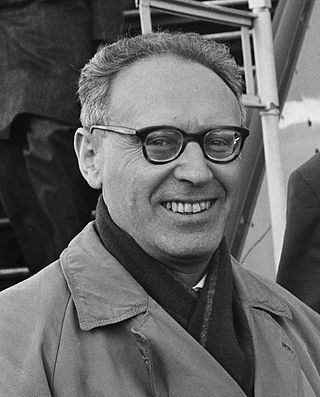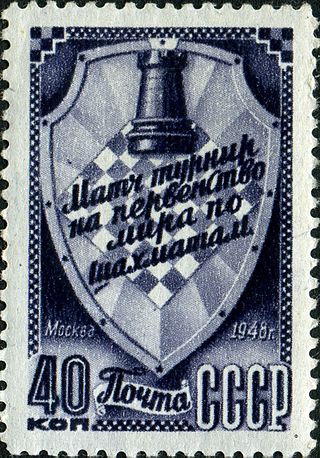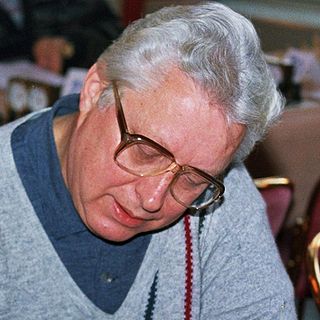
Tigran Vardani Petrosian was a Soviet-Armenian chess grandmaster and the ninth World Chess Champion from 1963 to 1969. He was nicknamed "Iron Tigran" due to his almost-impenetrable defensive playing style, which emphasized safety above all else. Petrosian is often credited with popularizing chess in Armenia.

Mikhail Nekhemyevich Tal was a Soviet and Latvian chess player and the eighth World Chess Champion. He is considered a creative genius and is widely regarded as one of the most influential players in chess history. Tal played in an attacking and daring combinatorial style. His play was known above all for improvisation and unpredictability. Vladislav Zubok said of him, "Every game for him was as inimitable and invaluable as a poem".

Mikhail Moiseyevich Botvinnik was a Soviet and Russian chess grandmaster who held five world titles in three different reigns. The sixth World Chess Champion, he also worked as an electrical engineer and computer scientist and was a pioneer in computer chess. He also had a mathematics degree (honorary).

Vasily Vasilyevich Smyslov was a Soviet and Russian chess grandmaster who was the seventh World Chess Champion from 1957 to 1958. He was a Candidate for the World Chess Championship on eight occasions. Smyslov twice tied for first place at the USSR Chess Championships, and his total of 17 Chess Olympiad medals won is an all-time record. In five European Team Championships, Smyslov won ten gold medals.

Paul Keres was an Estonian chess grandmaster and chess writer. He was among the world's top players from the mid-1930s to the mid-1960s, and narrowly missed a chance at a World Chess Championship match on five occasions. As Estonia was repeatedly invaded and occupied during World War II, Keres was forced by the circumstances to represent the Soviet Union and Nazi Germany (1941–44) in international tournaments.

Leonid Zakharovych Stein was a Soviet chess Grandmaster from Ukraine. He won three USSR Chess Championships in the 1960s, and was among the world's top ten players during that era.

Jørgen Bent Larsen was a Danish chess grandmaster and author. Known for his imaginative and unorthodox style of play, he was the second-strongest non-Soviet player, behind only Bobby Fischer, for much of the 1960s and 1970s. He is considered to be the strongest player born in Denmark and the strongest from Scandinavia until the emergence of Magnus Carlsen.

Alexander Alexandrovich Kotov (Алекса́ндр Алекса́ндрович Ко́тов; was a Soviet chess grandmaster and author. He was a Soviet chess champion, a two-time world title Candidate, and a prolific writer on the subject of chess. Kotov served in high posts in the Soviet Chess Federation, and wrote most of his books during the Cold War. The importance and breadth of Kotov's work rank him among the all-time greats in this field.
This is a timeline of chess.
Alexander Koblencs was a Latvian chess master, trainer, and writer. He is best known as the trainer of the 1960-61 World Champion Mikhail Tal.

The 1948 World Chess Championship was a quintuple round-robin tournament played to determine the new World Chess Champion following the death of the previous champion Alexander Alekhine in 1946. The tournament marked the passing of control of the championship title to FIDE, the International Chess Federation which had been formed in 1924. Mikhail Botvinnik won the five-player championship tournament, beginning the era of Soviet domination of international chess that would last over twenty years without interruption.

At the World Chess Championship 1963, Tigran Petrosian narrowly qualified to challenge Mikhail Botvinnik for the World Chess Championship, and then won the match to become the ninth World Chess Champion. The cycle is particularly remembered for the controversy surrounding the Candidates' Tournament at Curaçao in 1962, which resulted in FIDE changing the format of the Candidates Tournament to a series of knockout matches.

Evgeni Andreyevich Vasiukov was a Russian chess player, one of the strongest in the world during his peak. He was awarded the title of Grandmaster by FIDE in 1961. During his career, he won the Moscow Championship on six occasions and scored numerous victories in international tournaments, such as Belgrade Open 1961, Moscow International 1961, East Berlin 1962, Reykjavik 1968, and Manila 1974. He was rarely at his best in Soviet Championship Finals, which were among the very toughest events in the world, and never made the Soviet team for an Olympiad or a European Team Championship. Vasiukov won the World Senior Chess Championship in 1995.
Vladimir Alexeyevich Alatortsev was a Soviet chess player, author, and administrator. During his career, he became champion of both Leningrad and Moscow, and played in the Soviet Chess Championship finals nine times, with his best competitive results in the 1930s. He placed clear second in the 1933 Soviet final. He retired from most competitive play in the early 1950s, moving into roles as a chess organizer, teacher, and coach. He served as chairman of the All-Union chess section from 1954 to 1959 and as chairman of the USSR Chess Federation from 1959 to 1961. By profession, he was a hydraulics engineer.

The 1951 World Chess Championship was played between Mikhail Botvinnik and David Bronstein in Moscow from March 15 to May 11, 1951. It was the first match played under the supervision of FIDE; and the first to use a qualifying system of an Interzonal and Candidates Tournament to choose a challenger - a system which stayed in place until 1993.

A World Chess Championship was played between Mikhail Botvinnik and Vasily Smyslov in Moscow from March 16 to May 13, 1954. Botvinnik had been World Champion since 1948 and had successfully defended the title in 1951, while Smyslov earned the right to challenge by winning the 1953 Candidates tournament.

A World Chess Championship was played between Mikhail Botvinnik and Mikhail Tal in Moscow from March 15 to May 7, 1960. Botvinnik was the reigning champion, after winning the World Chess Championship 1958, while Tal qualified by winning the Candidates tournament. Tal won by a margin of 4 points.

Viktor Lvovich Korchnoi was a Soviet and Swiss chess grandmaster (GM) and chess writer. He is considered one of the strongest players never to have become World Chess Champion.
The USSR Chess Federation was the national organization for chess in the USSR. It was founded in 1924 and its headquarters were in Moscow. It was affiliated with the World Chess Federation. The USSR Chess Federation organized a USSR Chess Championship and published a newspaper called Шахматы в СССР.













